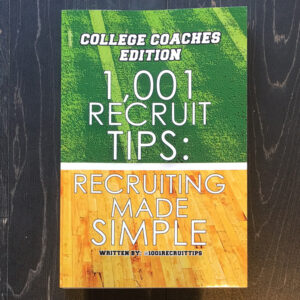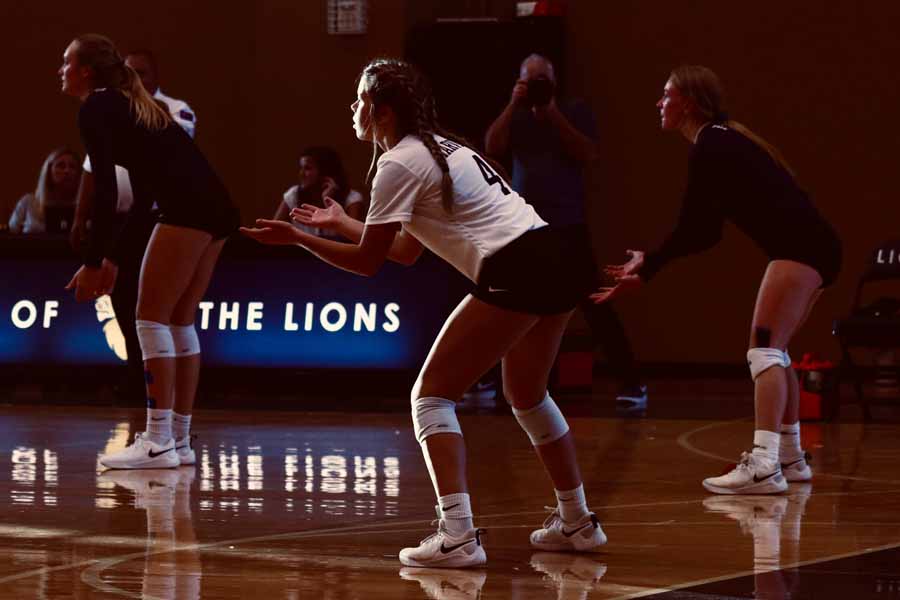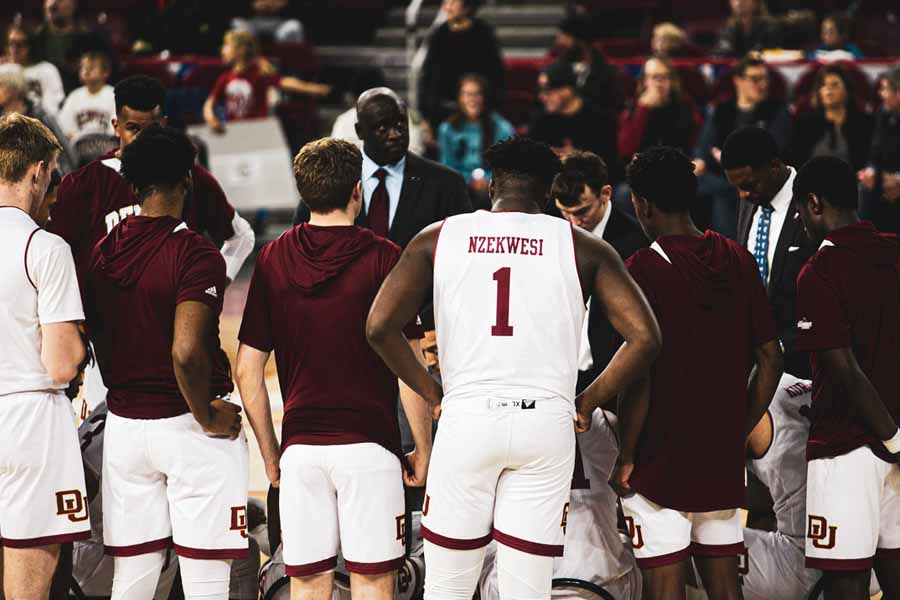I’ve learned from some of the best recruiters in the country. Each year there were some coaches who could sign nearly every player they pursued and other coaches who came up short every year.
Great recruiters are on the phone 24/7! Any time outside of practice or meetings—they’re on the phone. They’re pacing the hallways, on the treadmill, making a sandwich, watching video—all talking and talking and talking.
When possible, and without being a stalker, shadow these type of coaches to pick up patterns of what they talk about, how they talk to players and parents and how they wrap up calls.
What I’ve learned is that the best recruiters can talk to anyone at any time about anything, all while just being themselves. They can blend into any situation, walk into home visits or gyms from Hollywood to Iowa to Miami Beach to the bible belt of North Carolina to Brooklyn to Chinatown to Houston to Salt Lake City and blend in like the favorite family cousin.
This type of strength is something that must be mastered. For most coaches, it’s learned.
Young coaches—or those looking to climb ranks and build their recruiting skills – listen to the best recruiting coaches on staff. Listen to their endless phone calls. Listen to them during Unofficial and Official visits. Take notes. Listen to how they start the conversations, what questions they ask, their tone, ways they sell their program, their personality, how they ask the tough questions, how they break bad news, how they wrap up conversations.
Oftentimes, they will make back-to-back-to-back-to-back-to-back-to-back-to-back-to-back-to-back-to-back-to-back-to-back-to-back-to-back calls, often with similar scripts. If you don’t have a place to listen near their offices, listen on bus trips, car trips, waiting at the airport, after games. The best recruiters are endlessly on the phone. These are the coaches to shadow, conversation is an art!
MORE TIPS FOR GRAD ASSISTANTS AND INTERNS
• INVEST all of your time as a grad assistant or new coach. Be “the guy” or (“the woman”) who is always there. Even if there is nothing to do in the office, there is always SOMETHING to do. Coaches work 24/7/365 so if you are always around, they will begin to include you in more and more projects. The more dependable you are, the more projects you will be involved in, the more responsibility you will earn and the more likely you will be promoted or recommended for other jobs down the road.
• Work at other university camps if your head coach and schedule allows. It’s always good to expand your network, see how other coaches operate, work with new groups of players. Reach out to former teammates or coaches in your circle to inquire about working their university camps.
• In the offseason ask more experienced coaches you’ve worked with for advice. Don’t turn it into an interview, stick to one question and keep questions generic. The point is to LISTEN—“What’s the most important thing about recruiting?” “Best teaching points to use with players?” “Best ball handling drill?” “What are the keys to being a good talent evaluator?” Ask for a few pointers, and let them lead the conversation. See where the conversation takes you, you could pick up a few great lessons if you take the time to ask, listen and learn.
COACHES: Read more from ‘Recruiting Made Simple’
• Coaches are ALWAYS watching what you do, who you are friends with, how you carry yourself, how you interact with people, if you are punctual, if you delegate everything, your attitude—inside and outside of the facility. They may not call you out on it or even be coaches that you interact with or speak too, but know that they are always sizing you up and taking mental notes. Their opinions can help you or hurt you down the road with recommendations. Don’t give them, or one of their contacts, a reason not to hire you!
• Help players at your position get extra position-specific work. Ask the starters if they want to take some extra reps, or offer to work with the backups, injured players and freshmen. Help your unit get stronger!
• Don’t always be the one trying to get on camera—coaches know when you are going out of your way to do it, and it’s obnoxious! Incidental camera time is fine, just don’t jockey for it!
• Always bring a great attitude to work, even if you are having down days. Keep your personal issues to yourself, the team would never accomplish anything if every coach brought their personal issues to the office or complained about all of their problems. A drama-free personal life is important at this stage of your career, you won’t have much time for a personal life.
READ MORE: 180 Ways to Market Your Program
• Think ahead, anticipate what’s next. What will your coaches need today/this week/next week? It’s always better to be prepared for a project that never comes, than to have an opportunity and not be prepared!
• You don’t know everything! Be humble, be patient, be ready to work for it. Great coaching careers take a decade or more to build. You are in the position to learn. You don’t need to prove or brag about your knowledge, instead focus on learning as much as you can!
• “This is how we did it at __________” doesn’t usually go over very well with new bosses unless they ask for your suggestions. You are gaining key experience for the future, seeing how different coaches operate. Learn from their strengths and weaknesses, what works and what doesn’t.
• Take the time to get your responsibilities and projects right. It doesn’t have to be a race to get it done first, it’s much better to get it accurate. If coaches have to always make you re-do things or double-check you all the time, that’s not good and it will hold you back from future responsibilities and promotions, and a negative trait they will share with future employers with job recommendations. While coaches usually want everything yesterday, it’s better to get it right than to get it done fast.
• Reward yourself a little! Have a balance, try to make some friends outside your office. Grad assistants or interns are often overworked, underpaid and have little free time—make sure to reward yourself on occasion for all the hard work you’re putting in.
• Listen twice as much (or more) than you speak!
• Your days will be unpredictable… you just never know who you’ll cross paths with. Dress daily in a professional way—always clean, crisp and professional. It’s always a great idea to keep a spare tie, dress, dress shoes and any other “church clothes” essentials that you can change into quickly if needed, to save time from running home.
• As grad assistants or interns, yes, your job may unofficially include picking up dry cleaning, taking coaches on airport runs, picking up lunch, shuttling coaches’ kids or wives around, house sitting or dog walking. Your job is to make your bosses’ job easier, and by doing these non-coaching tasks you are freeing up their time and energy to focus on other more important responsibilities. My approach was to do whatever I could do to take off my coaches’ plate, in order to free them up to watch extra film, game plan or call recruits.
#CoachTips: Read more articles for coaches
• You have to adopt the “nothing is below me” approach. You may think you are being tested or handed busy work, but you aren’t. A lot of tedious things must get done: class checks, envelope stuffing, ridiculous stat research—it’s all important to your bosses and future references. Take it all on with enthusiasm and they’ll entrust you with more.
• You need to have one of the best energies in the building—especially at practice and around players. You need to keep the atmosphere positive, relentless, energetic. Be yourself—don’t force it—but be outwardly positive and energetic. Clap it up! Help keep the players relaxed.
• Be the first in, last out in the office. Nobody should beat you to work.
• With work, you earn two ways—money or experience. Experience will bring you money down the road, learn as much as possible, especially early in your career. Watch. Be there. Soak it in. Even if not involved, get a feel for what every coach and staff member on the team does. The linebacker coach doesn’t only coach linebackers—they likely have academic, recruiting, housing, discipline, practice, budget, scheduling and/or equipment responsibilities. You aren’t just learning the X’s and O’s, you are learning how a program operates. You are learning people-management skills.
• Coaching is teaching—so it’s important to learn teaching methods. To be a great coach you must be a great TEACHER and tremendous communicator. Learn communication and teaching methods.
• Find a responsibility that you can call your own, no matter how tiny it may be. Treat it like a major responsibility, and work to become best in the nation or conference at it. Anything from cutting film, special teams, equipment, laundry, stuffing envelopes, airport runs… it’s all critical.
• Don’t drink with players or socialize where they party—it’s not professional. You are not their friend, even though you are probably closer in age to them than your bosses. You are part of the coaching staff- act like it.
• Don’t get drunk around your coaches, even if they do. You never want to say something or do something that can cost you your job, and it’s much more likely to happen if you are getting drunk with your bosses.
• Be yourself! Know when to be serious and quiet, and when it’s ok to show your personality. You are spending so many hours together, and coaches want to add great people to their staff- it’s ok to have a sense of humor and personality.
• It’s important—critical—to find any way possible to get involved in recruiting. You are limited what you can do with recruits as far as making calls or going out on the road, but there are other responsibilities within the operations of a team in terms of recruiting that you can bring value to.
• When recruits are on campus, realize that everyone in their circle is important. Treat their family, friends, coaches and any other visitors with them on campus in a first-class way. The coaching staff is not only building relationships with the recruit, but also with their entire circle.
• Help keep players loose, especially during intense times or losing streaks. There is a difference between horsing around and keeping players loose- know the difference. Keep them level headed, cut the tension and pressure and be positive, even in losing streaks. Help eliminate pressure off your players’ shoulders so they play loose.
• Do not gossip! Other staffers or interns within the department will likely pump you for information… play stupid! One of the #1 things coaches look for is loyalty—what happens within the team stays within the team. Keep everything in-house—gossip spreads like wild fire and quickly gets traced back to you!
• Memorize the head coach’s mission statement or core philosophy! Reinforce it with players, use the same terms or keywords that your head coach emphasizes. It’s their plan, and your job to help turn into reality. You all have to share the same mission.
• Don’t allow your players to be average. Encourage positive behavior: class attendance, grades, leadership roles, extra reps, focus, toughness! Even if you work only with the scout team—coach your players up! Act as if you are coaching the starters.
• Learn how to evaluate talent. Ask more experienced coaches (especially ones good at finding great, unheard of players) to sit in with them while they watch recruit video and ask for tips.
• Some of you may not be cut out to be coaches, and you’ll figure that out within a year or two. Luckily, there are other opportunities within the sport– video, scouting department, recruiting, operations.
READ MORE: Find more Coach Tip articles here





